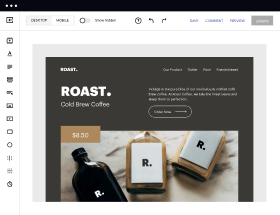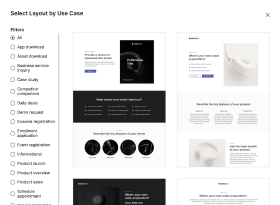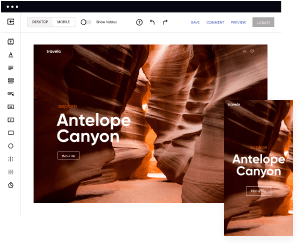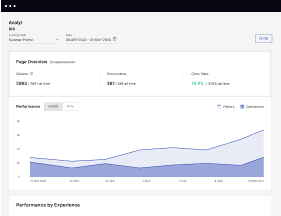Get a starting point with the Javascript optimized checkout page template
Supercharge your checkout page with Javascript for outstanding performance! Learn more today.

Easy to build without coding
With the intuitive drag-and-drop builder, anyone on your team can create high-converting pages without any knowledge of code or design. Make enhancements to your landing page with custom widgets using Javascript, HTML/CSS, or third-party scripts.
Multiple layouts for any industry and goal
Select from 500+ landing page layouts built to boost conversions across industry-specific scenarios. Customize them by adjusting fonts, adding images, and generating on-brand content with the AI assistant. Quickly scale with Instablocks® and Global Blocks that you can save, reuse, and update globally.
Loads fast and looks polished on any device
Every template is responsive, which means they present professionally on any device and load blazingly fast with our Thor Render Engine. You can also power them up with Google AMP technology to deliver an unparalleled mobile experience and drive higher conversions.
Robust analytics & experimentation
Get real-time updates and reporting across all your devices, showing the number of visitors, conversions, cost-per-visitor, and cost-per-lead. Launch AI-powered experiments, run A/B tests, and use heatmaps to analyze user behavior, then optimize your landing page to maximize conversions.
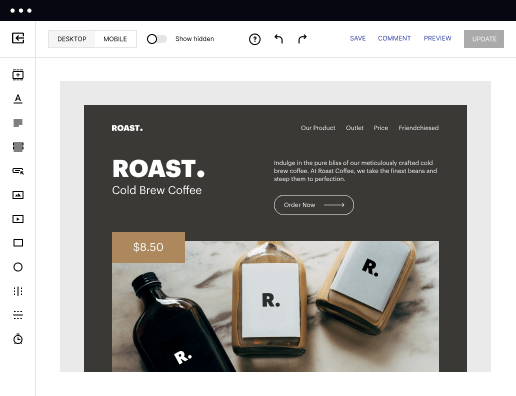
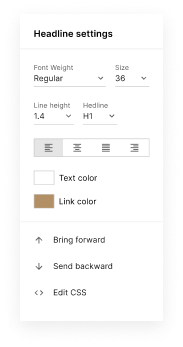
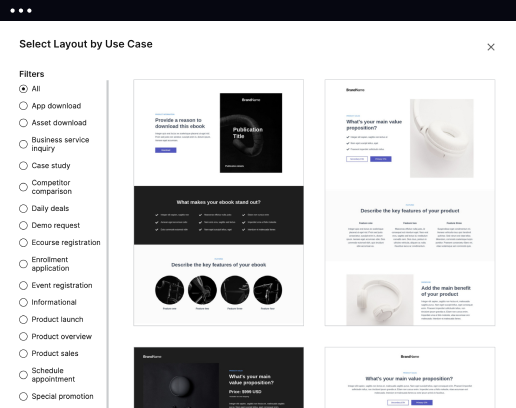
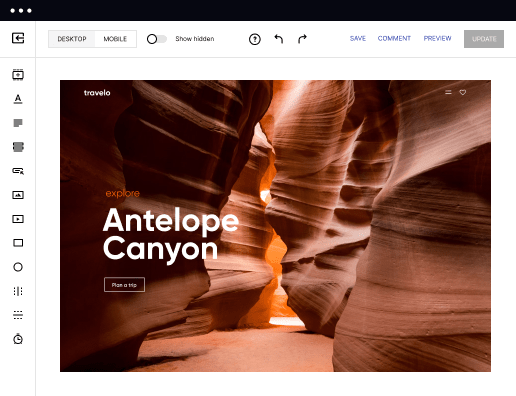
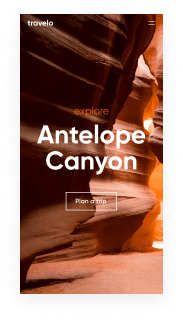
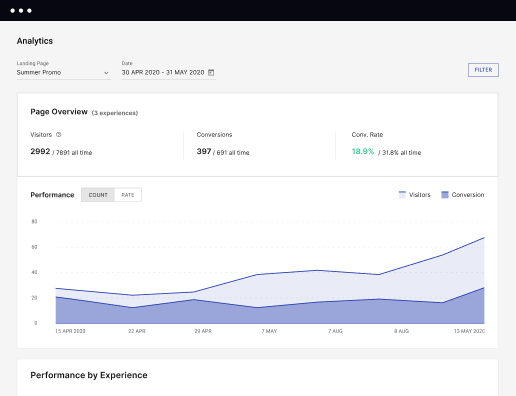
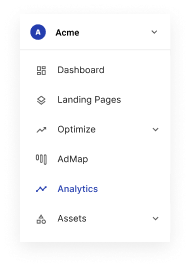
Easy to build without coding
With the intuitive drag-and-drop builder, anyone on your team can create high-converting pages without any knowledge of code or design. Make enhancements to your landing page with custom widgets using Javascript, HTML/CSS, or third-party scripts.
Multiple layouts for any industry and goal
Select from 500+ landing page layouts built to boost conversions across industry-specific scenarios. Customize them by adjusting fonts, adding images, and generating on-brand content with the AI assistant. Quickly scale with Instablocks® and Global Blocks that you can save, reuse, and update globally.
Loads fast and looks polished on any device
Every template is responsive, which means they present professionally on any device and load blazingly fast with our Thor Render Engine. You can also power them up with Google AMP technology to deliver an unparalleled mobile experience and drive higher conversions.
Robust analytics & experimentation
Get real-time updates and reporting across all your devices, showing the number of visitors, conversions, cost-per-visitor, and cost-per-lead. Launch AI-powered experiments, run A/B tests, and use heatmaps to analyze user behavior, then optimize your landing page to maximize conversions.
All the features you need to build lead-generating landing pages
Explore more featuresLearn how to build top-performing landing pages for any goal
FAQs
Leading the way in building high-performing landing pages





A comprehensive guide to optimizing your landing pages with Instapage
Harness the unparalleled capabilities of Instapage's landing page and conversion rate optimization (CRO) platform to drive meaningful results for your digital marketing efforts. With access to an abundance of conversion-focused templates and data-driven optimization tools, your marketing campaigns can truly flourish. Here’s a structured approach to utilizing Instapage effectively.
Understanding the power of Instapage’s templates
Instapage offers over 100 high-converting templates that are fully customizable to align with your specific campaign objectives. Each template is designed with conversion in mind, ensuring you launch pages that not only attract clicks but also convert visitors into leads and customers.
- High-converting design: Templates are tested for effectiveness, ensuring higher conversion rates.
- Ease of use: The intuitive page builder allows for seamless editing without needing coding expertise.
- Lead generation elements: Integrated forms and call-to-action buttons are easily customizable to suit your brand.
Creating your first landing page with Instapage
Initiating your first landing page creation is straightforward and user-friendly. Begin by selecting a template that resonates with your campaign’s goals.
- Choose a template that fits your message or service, whether it's for lead generation or sales.
- Utilize the drag-and-drop editor to add or modify elements swiftly.
- Incorporate personalized content elements using dynamic text replacement to enhance user relevancy.
Optimizing your landing page for higher conversions
Once your landing page is set up, it’s crucial to optimize it for performance. Leverage Instapage’s built-in optimization tools to fine-tune your pages.
- A/B testing: Experiment with different headlines, images, or CTAs to identify what converts best.
- Heatmaps: Analyze user interactions on your page to understand where visitors spend the most time.
- Analytics dashboard: Monitor key performance indicators to make data-driven decisions for further improvements.
Through these methods, you’ll not only track your success but also continuously improve your campaign efforts over time.
The ability to create, optimize, and personalize landing pages using Instapage empowers marketers like you to achieve their digital marketing objectives effectively.
Ready to maximize your marketing ROI with Instapage? Begin your journey today by exploring our features and start creating high-impact landing pages that convert!
People also ask about Javascript optimized checkout page template
JavaScript optimized checkout page template
Understanding the importance of an optimized checkout page
An optimized checkout page plays a pivotal role in the success of any e-commerce business. As customers navigate through their purchasing journey, the checkout page serves as the final touchpoint before completing the transaction. Therefore, investing time and resources into designing a user-friendly, efficient checkout page can significantly impact conversion rates and overall revenue.
Inadequate checkout processes can lead to cart abandonment, resulting in lost sales opportunities. Customers seek a seamless experience that inspires trust, which is often built through an intuitive layout and fast loading times. By enhancing the customer experience on this critical page, businesses not only improve conversion rates but also foster brand loyalty.
Key components of an effective checkout page include user interface design that prioritizes usability, and functionality that supports quick interactions. A thoughtfully designed checkout page often features simplified layouts, clear calls to action, and easy navigation, all crucial for maintaining customer engagement until the final click.
Exploring JavaScript's role in checkout optimization
JavaScript plays a vital role in enhancing user interactions on checkout pages. By leveraging JavaScript, developers can implement features such as real-time data validation, which checks user input as it's entered, minimizing errors before the form is submitted. This immediate feedback encourages users to correct mistakes without the frustration of submitting the form only to face rejection.
Additionally, JavaScript facilitates dynamic content updates, allowing users to see changes in pricing, shipping options, and estimated delivery times without needing to refresh the page. This not only streamlines the shopping experience but also keeps users informed about their purchases in real-time.
Popular JavaScript frameworks, such as React, Angular, and Vue.js, can bring structure and efficiency to the development of checkout pages. Utilizing a modular design through these frameworks allows developers to create reusable components that speed up development time and enhance maintainability.
Core features of a JavaScript optimized checkout page
A JavaScript optimized checkout page incorporates several core features that enhance usability. Simplified form inputs are crucial; integrating auto-fill capabilities saves users time by pre-populating fields based on previous entries. Additionally, strategically placed fields can guide users effortlessly through the checkout process, ensuring an efficient experience.
Real-time error handling is another essential feature. Providing instant feedback—such as highlighting incorrect fields or suggesting corrections—assures users that they are on the right track, resulting in higher completion rates. Streamlined navigation and accessibility foster a user-friendly environment that welcomes diverse customer groups, which can include utilizing keyboard shortcuts to enhance efficiency.
Responsive design remains vital in today's multi-device landscape. A checkout page must adjust seamlessly to different screen sizes, ensuring that mobile users enjoy the same frictionless experience as desktop users. Progress indicators help maintain user engagement, especially for multi-step checkouts; visual cues can significantly reduce anxiety and keep users informed about their progress.
The benefits of using a JavaScript optimized checkout page
Implementing a JavaScript optimized checkout page can lead to substantial benefits for an e-commerce business. Primarily, businesses can see increased conversion rates; with fewer cart abandonments, companies can turn potential sales into actual revenue. Enhanced transparency during the checkout process fosters customer trust, thereby encouraging repeat business.
Speeding up page load times is another critical advantage. Quick interactions are vital for keeping users engaged, as delays can lead to frustration and abandonment. Techniques such as minimizing HTTP requests, utilizing asynchronous JavaScript loading, and optimizing images can significantly reduce latency, resulting in a smoother experience.
Moreover, utilizing technologies that track user behavior provides invaluable insights into the checkout process. By analyzing this data, businesses can identify pain points and areas for improvement, leading to better overall experiences and increased customer satisfaction.
FAQ: Addressing common queries about JavaScript checkout pages
Addressing common queries can demystify the process of creating a JavaScript optimized checkout page. For instance, many wonder which technologies enable a successful checkout page. Common technologies include JavaScript frameworks, HTML5, CSS3, and server-side languages that offer integration and data management capabilities.
Implementing a JavaScript optimized template involves several steps: selecting the aforementioned technology, designing user-centric layouts, integrating real-time validation, and thoroughly testing the page across multiple devices. For support, various communities and forums are dedicated to sharing best practices and troubleshooting common problems.
Different regions may require unique considerations; localization strategies ensure content resonates with diverse customer bases. Teams involved in the development process should include marketers, UX/UI designers, web developers, and data analysts, fostering a collaborative environment focused on optimizing the user journey.
Crafting content for maximum engagement on checkout pages
The content presented on checkout pages must focus on engagement. Clear calls to action can significantly impact user decisions; thus, effective wording and strategic positioning are crucial. Action buttons should stand out visually, making it easy for users to identify the next steps in their purchasing journey.
Utilizing trust signals and security features is equally important. Displaying SSL certificates and well-recognized security badges reassures users that their information is safe. Including user testimonials and reviews can enhance credibility, fostering a sense of connection and encouraging potential customers to follow through with their purchases.
Visualizing success: Page previews and prototypes
Creating visual representations of the checkout page through previews and prototypes can significantly streamline the design process. Design software and prototyping tools allow teams to lay out their ideas effectively, ensuring that everyone is on the same page before development begins. These visual aids help clarify complex features and interactions.
Moreover, testing prototypes with real users provides insight into usability and functionality. Gathering feedback during this phase can influence design tweaks, ensuring the final product aligns with user expectations. Continuous iterations and incorporating community feedback during the design process can enhance overall satisfaction.
Enhancing knowledge around checkout optimization techniques
Enhancing knowledge about checkout optimization techniques is crucial for ongoing success. Participating in online workshops and webinars provides marketers with valuable insights into industry best practices. Additionally, building Q&A platforms can foster a culture of continuous learning, allowing professionals to share their experiences and solutions with one another.
Creating forums and discussion groups encourages collaborative dialogues among users and industry experts. These collectives promote knowledge exchange, helping businesses stay updated with the latest trends and techniques in checkout optimization and overall user experience.
Ensuring continued access to resources and support
Developing a comprehensive resource library that compiles valuable tools, templates, and best practices for optimizing checkout pages ensures that businesses can access what they need when they need it. This library can significantly simplify the learning curve for those new to e-commerce or looking to improve their existing processes.
As technology continually evolves, businesses must be prepared to adapt their checkout processes. Future-proofing checkout pages entails staying flexible to embrace new trends, standards, and technologies, ensuring sustained user satisfaction as user expectations change.
Case studies: Successful implementations of JavaScript optimized checkout pages
Examining successful case studies reveals the transformative power of JavaScript optimized checkout pages. For example, Business A implemented a simplified layout and real-time validation that resulted in a notable increase in conversions. Their focus on user experience transformed their checkout into a streamlined process, reducing abandonment rates significantly.
In another instance, Business B showcased innovative use of feedback mechanisms, allowing users to see real-time updates on product availability and shipping times. This transparency built trust, leading to higher customer satisfaction and repeat purchases. Finally, Business C leveraged community feedback to continuously improve their checkout experience through iterative designs, adjusting to customer needs over time. Each case illustrates that optimizing checkout pages can yield meaningful results when done thoughtfully.
Ready to skyrocket conversions?
Supercharge your ad campaigns with high-performing landing pages
Get started



